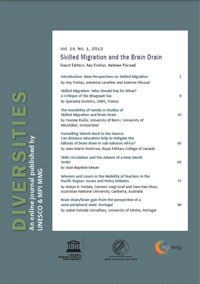Winners and Losers in the Mobility of Teachers in the Pacific Region: Issues and Policy Debates
by Robyn R. Iredale, Carmen Voigt-Graf and Siew-Ean Khoo (Australian National University, Canberra, Australia)
To cite this article: Iredale, R. R., Voigt-Graf, C., & Khoo, S.-E. (2012). Winners and Losers in the Mobility of Teachers in the Pacific Region: Issues and Policy Debates. Diversities, 14(1), 77–98. https://doi.org/10.58002/ywrp-4808
The focus of much high skilled migration research has tended to be on health and IT professionals. This chapter addresses the mobility of school teachers in a geographic region that has received little attention, the Pacific. Unlike the Caribbean Islands and South Africa, the Pacific has not been the focus of much research into the demographic, economic and geographic factors impacting mobility, nor into the social, economic and demographic consequences of mobility.
Given the teacher shortages that are occurring in many industrialised countries on the Pacific Rim, (including Australia, New Zealand, Canada and the US) and the tailoring of immigration and long term visitor policies to attract highly skilled workers in areas of shortage, the Pacific could be affected. The article demonstrates that of three countries studied as part of a comparative project, only Fiji has been losing teachers to an extent that has been harmful to the country’s education system. Most mobility has been related to political events but, nevertheless, the negative consequences are a matter for concern. Australia has benefited from the immigration of highly skilled Fijian teachers and its aid policies could be used as one way of addressing the loss of skilled human resources from Fiji. This could alleviate some of the tension and go some way towards meeting the demands for compensation. Many of the debates surrounding skilled migration and brain drain are investigated in relation to Fiji where political instability makes this an even more interesting case to examine.
On the other hand, the Cook Islands and Vanuatu experience low levels of international teacher emigration and this situation will remain as long as many of their teachers continue to be trained to levels that are not acceptable in the labour markets of industrialised countries. This has mainly been a matter of a shortage of resources rather than a deliberate policy of ‘under-training’. If an upgrading of training does occur, however, the situation could change. This introduces a dilemma for these countries as they strive to upgrade qualifications and skills, as per the Millennium Development Goals, but seek to retain their own teachers.
Keywords: Australia, teacher mobility, Pacific Islands, brain drain, development
|
